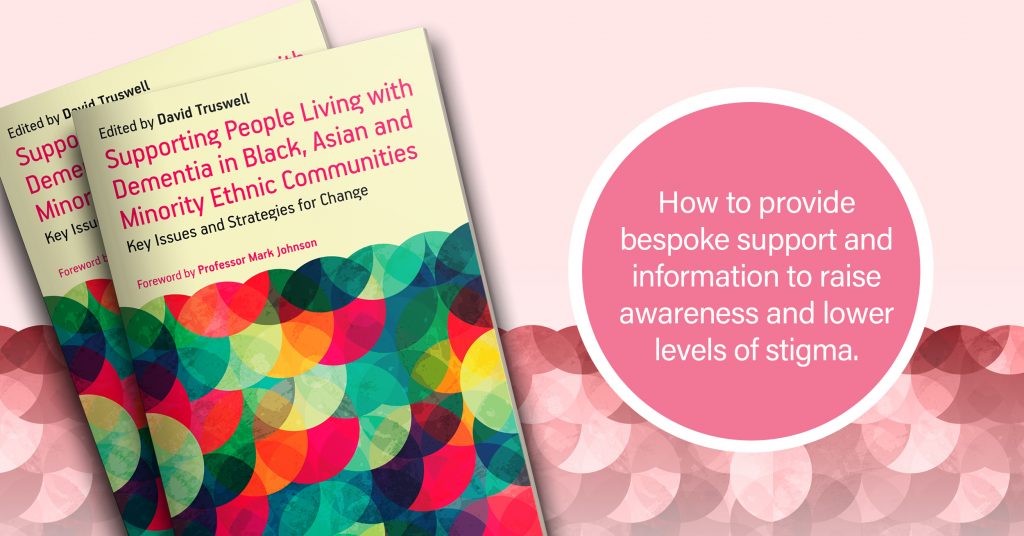
Why should anyone working in dementia care read this book?
by David Truswell
Worldwide it’s estimated that there are currently 50 million people living with dementia[i]. In the UK there is increasing evidence that both the African Caribbean and South Asian communities have a higher incidence of dementia than the White UK population, yet studies show that people from these communities are under-represented in Older Peoples services[ii]. Vague appeals for ‘more research’ continue to swirl around underpinned by a stereotyping of BAME communities as ‘hard to reach’ and ‘looking after their own’.
With some in BAME communities believing that “We Don’t Do Dementia”[iii] and much of the dementia awareness information in the mainstream media using stock images representing BAME carers and people living with dementia it’s not surprising that BAME communities in the UK may be slow to realise dementia is an urgent community health issue for them. Few people who are living with dementia and their carers from BAME communities have the confidence to speak out about their experience or take part in dementia clinical research. Nevertheless, several have contributed to Supporting People living with Dementia from Black, Asian and Minority Ethnic Communities (Jessica Kingsley Publishers).

In this book, myself and colleagues explore not only the academic research but also the experience of people from a number of BAME communities in the UK who share their vivid accounts of coming to terms with living with the illness. Their stories highlight the importance of having empathic and personal support from clinical services working with family members and those living with dementia. Far from being ‘hard to reach’, these stories highlight the value to families of working with informed and cooperative service providers. Stories of being let down by services often hinge on service personnel not asking those close to person living with dementia for information about them, especially at what are often called ‘transitions in care’; for example, an unexpected stay in hospital.
Clinical personnel who assume that family carers in BAME will ‘look after their own’ are failing to consider the individual personal circumstances of the person living with dementia seeking help. In the book, we show some of the nuanced variations in family expectations of supporting people living with dementia across and within cultural communities and highlight the risks involved in failing to provide the information and carer support that family carers themselves may feel unable to ask for.
Important themes of the book are increasing involvement of BAME community groups
in research, taking a more imaginative approach to recruiting research subjects
and ensuring that academic and clinical dementia research projects better
engage with these under-represented groups.
Supporting People Living with Dementia in Black, Asian and Minority Ethnic Communities: Key Issues and Strategies for Change , Edited by David Truswell is published by Jessica Kingsley Publishers (2019). For more information click here
David Truswell has worked in community-based mental health services in the UK for over 30 years. He is Chair of the Dementia Alliance for Culture and Ethnicity, and set up somefreshthinking limited in 2016 to change management in health and social care services
[i] Alzheimer’s Disease International World Alzheimer Report 2019 Attitudes to dementia Alzheimer’s Disease International, London. September 2019.
[ii] All Party Parliamentary Group on Dementia Dementia does not discriminate The experiences of black, Asian and minority ethnic communities All Party Parliamentary Group on Dementia July 2013
[iii] Berwald S, Roche M, Adelman S, Mukadam N, Livingston G (2016) Black African and Caribbean British Communities’ Perceptions of Memory Problems: “We Don’t Do Dementia. PLOS ONE 11(4): e0151878. https://doi.org/10.1371/journal.pone.0151878